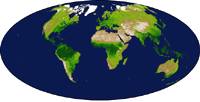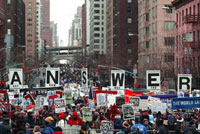Petitions have been arriving in a flurry in my email inbox lately. I have some doubts about the efficacy of all this petitioning and tend to be quick with the delete button, but one recent petition drew me in.

The message itself — which stated that the United Nations was collecting signatures of people opposed to a U.S. invasion of Iraq — wasn’t that different from the others that arrived that day. But I was intrigued by the long list of signatures, each with the signer’s hometown noted. Signature by signature, I traced the petition’s journey from friend to friend, country to country. The trail crossed the Atlantic Ocean 14 times and the Pacific Ocean twice.
The list of signers could have come right out of my daughters’ bedtime tape. This is the one where Raffi, favorite minstrel of the preschool set, says, “Now, boys and girls, you have a chance to hear a song about the names of people from around the world.”
Raffi could have randomly picked a few names from this list and he would have had his song:
Philippe comes from France, Tomas comes from Sweden, and Gonzolo comes from Ecuador.
Natalia comes from Chile, Marta comes from Spain, and John comes from the United States.
Call me sappy if you want, or sentimental. Say I’ve been listening to too much Raffi and not enough nightly news. Say what you will, I think this list of names is beautiful. Seeing people — even just these few people — trying to come together and speak with one voice fills me with hope. From Stockholm to Quito, a lot of us are groping for ways to say what we each feel in our hearts: that peace is better than war and war is unacceptable when all the tools of peace have not been exhausted.

What a wonderful world.
Image: NASA.
We share only one atmosphere and a few oceans, and an awful lot of us understand the implications of that. We know that to steward a global resource, we need global agreements and global bodies to implement them. We know we must speak with one voice about climate, about water, about refugees, and about poverty.
Trust an astronaut, who viewed the Earth from space, to say it most beautifully:
You look down there and you can’t imagine how many borders and boundaries you cross, again and again and again, and you don’t even see them. There you are — hundreds of people in the Middle East killing each other over some imaginary line that you’re not even aware of, that you can’t see. And from where you see it, the thing is a whole, the Earth is a whole, and it’s so beautiful.
Those words — from Russell Schweickart, who orbited Earth in 1969 — touch us because, although they were inspired by a journey to space, we can feel their truth down here on the ground.

Global citizens.
Photo: Punchdown.org.
So it does not surprise me that so many people signed that U.N. petition. When you know, deep in your soul, that the Earth is a beautiful whole and that people are one family, then sending a petition to a world body seems like a natural thing to do. You might not expect to change the course of human history, but it seems reasonable to expect that your signature as a citizen of the world will at least be noted somewhere.
But, half an hour after I first opened the petition, a second message arrived from the sheepish colleague who had forwarded the petition in the first place. She’d learned that it was a hoax. She referred me to the website of the U.N. Information Centre for more details, where I read the following:
The U.N. is not involved in soliciting or collecting such petitions. We would suggest that since it is member governments of the U.N. who [sic.] will decide on whatever action occurs in various situations, citizens should contact their own government[s].
Whoever wrote those words is right, of course, at least for now. The U.N. does not represent people, only governments. There is no forum yet for the world’s people to come together out of our sense that “the thing is a whole.”
But whether we have organized ourselves yet or not, the thing is still a whole. We feel its wholeness as the climate changes. We feel its wholeness as the rage of the dispossessed in one part of the world spills over onto other people in other parts of the world. And we feel its wholeness as our children fall asleep to songs about people from around the world.
As the reality of the wholeness of our planet becomes harder to ignore, more and more of us are going to identify ourselves as citizens of the whole planet. More and more of us are going to turn to something that we have yet to create: a government that must answer to all of the people of the world.


